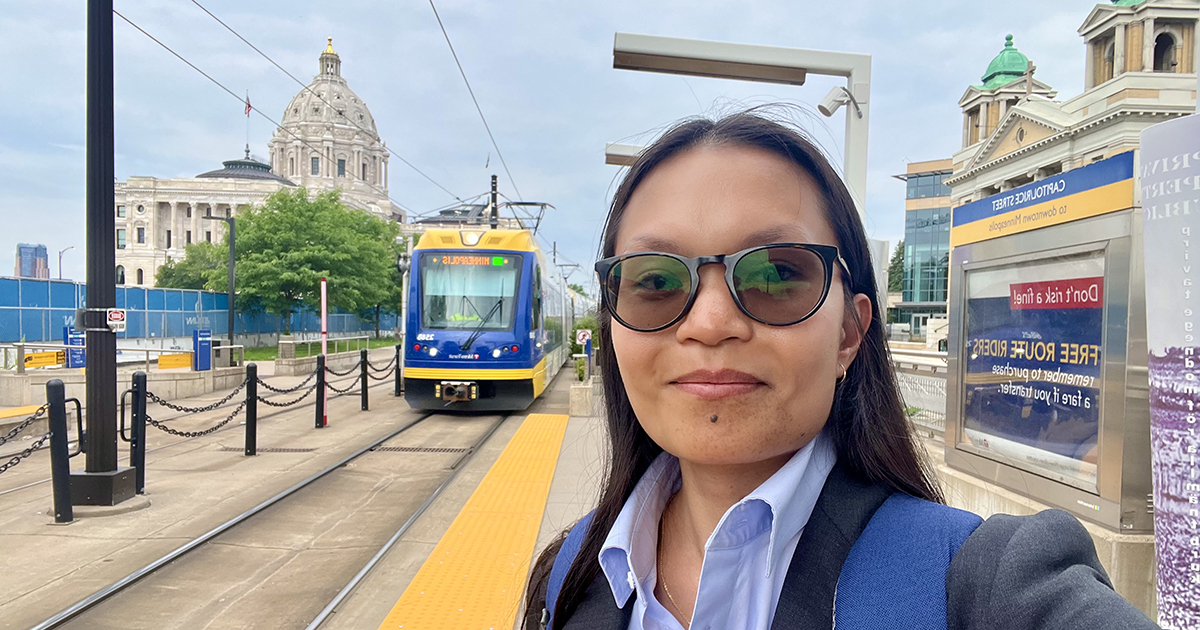What the 2025 Transportation Bill Means for Transit and Climate Progress in Minnesota
Over the past five months, Move Minnesota and Move Minnesota Action worked with advocates, organizational allies, and legislative champions to push back against attacks on our hard-won victories for public transit and climate action—and to push forward policies to make transit more affordable and accessible to everyone. Together, we made a difference through actions and testimony at the State Capitol, in-person events, and thousands of messages to elected leaders. And, with your help, we kept on pushing to influence negotiations after state lawmakers ended their regular session with big transit and climate decisions still on the line. On Monday night, lawmakers finally passed the transportation bill in a special session vote. The bill will soon head to Governor Walz for his signature.
The complex dynamics at the State Capitol made this a challenging year for many advocates and lawmakers alike. We didn’t get everything we worked for this session, but overall the 2025 transportation bill is an essential defensive win for our transit and climate priorities.
What passed in the final bill:
- Our nation-leading Driving Down Emissions law is safe. Some state lawmakers really wanted to roll back this law’s power to curb greenhouse gas emissions, driving, and unfettered highway expansion–but our collective advocacy helped make it clear that protecting climate progress is non-negotiable. This critical climate policy to expand sustainable transportation choices and reduce highway pollution will be implemented on schedule and as intended. No delays and no loopholes. This is a major defensive win for Minnesota communities, our health, and our climate–now and for generations to come.
- The long-term, dedicated funding we passed to provide ongoing resources for public transit service in the Twin Cities metro is safe. Some lawmakers tried to claw back public transit investments to spend on roads and highways instead. But we successfully fought back all attempts to dilute and redirect the historic metro-area sales tax for transit so that these dollars will continue to fund the transit service expansion and improvements riders need and deserve. Unfortunately, some state leaders successfully pushed through a last-minute deal on the final bill that blocked an increase in long-term, dedicated funding for bus rapid transit, while allowing millions in transit funding cuts to move forward as planned. Reserving more of the sales tax funds for bus rapid transit rather than allowing broader use on county transportation projects would have raised an additional $45-50 million annually for building out the bus rapid transit network–with no negative impact on the state budget. In contrast, this eleventh-hour decision will make it harder to improve and expand bus service in the metro region–and undermines the legislation that had been previously agreed upon and presented to the public right up until the final vote.
- We successfully fended off the biggest cuts to public transit, but lawmakers still agreed to reduce state funding for bus and rail service in the metro and Greater Minnesota over the next four years. From 2026 to 2029, state investments in Metro Transit will drop by $86.3 million total. Greater Minnesota transit will drop by $22 million total from 2026 to 2027, but remain whole from 2028 to 2029. While we fought hard to protect all investments in public transit this year and we’re frustrated with cuts in this deal, this final compromise preserves tens of millions more for Twin Cities transit compared to the Governor’s recommended cut of nearly $130 million and the nearly $105 million cut in the bad bill House members narrowly passed in May. We noticed a clear boost in tone and energy from our legislative champions after this House vote, which helped contribute to successful defensive work for the rest of session. And these smaller cuts are a significant improvement thanks to elected allies and advocates who did not give up in the face of strong anti-transit opposition–and pressure from Governor Walz to cut transit and transportation spending overall. Importantly for metro communities, these one-time cuts will come from the general fund but leave dedicated transit sales tax dollars untouched, minimizing longer-lasting impacts to transit progress.
- Metro Mobility-certified customers will be able to ride transit for free. This is a permanent extension of the 2023-24 pilot program where riders with disability or health conditions could ride any regular-route bus or light rail in the metro for free.
- Funds are appropriated to transportation management organizations (TMOs) in the metro area, such as Move Minnesota, to connect more people to sustainable transit, biking, walking, and rolling choices. This is important for our local work on commuter education and assistance, and in supporting our region in mitigating congestion and reducing transportation pollution.
- Active transportation will feel some short-term pain, but long-term gain. The transportation bill reduces state funds for biking, walking, and rolling by $11 million over the next two years. But starting in 2028 the base transfer from the general fund to the active transportation account will be $8.3 million per year, furthering the expansion of safe and welcoming trails, sidewalks, and bikeways across Minnesota.
- Remaining resources for the Northern Lights Express are secure. A regular session bill unfortunately took $77 million from this long-awaited passenger rail project connecting Duluth and the Twin Cities, but some lawmakers also wanted to gut the remaining funding, use it for road building, and kill this transit project altogether. By protecting the remaining $108 million in state resources for Northern Lights Express in the special session agreement, it is possible for project planning and development to continue and for federal dollars to come through as expected (assuming other threats to federal transit funding don’t get in the way). To be clear: Northern Lights Express deserves the full funding state leaders passed two years ago. But in a less than ideal situation, the final transportation bill is good news for communities along this line and for the many Minnesotans who want more options for sustainable travel.
- Lawmakers unfortunately did not update our state’s rigid definition of “highway purposes” to unrestrict resources for sustainable transportation. We will continue working with allies and partners to build necessary support for removing these outdated restrictions next session so more state funds can be used to expand the biking, walking, rolling, and public transit options that strengthen our communities and reduce pollution.
Our essential defensive wins in the new special session transportation bill add to another exciting transit win we secured in May:
- The new legislation we advocated for will make it easier for thousands of eligible Minnesotans to access the Transit Assistance Program (TAP)! Passed in the final hours of the session, this has been among Move Minnesota Action’s top priorities this spring. The new law will add this proven but underutilized reduced-fare program to the MNbenefits portal where Minnesotans already sign up for assistance with the costs of other essentials including housing, food, and energy. This important change will make public transit more affordable for those who need it most, helping people get where they need to go while reducing financial strain on families and workers’ household budgets.
When we secured long-term, dedicated funding for transit, biking, walking, and rolling in 2023 and strengthened our Driving Down Emissions law in 2024, we put Minnesota on a nation-leading path to a healthier, more affordable, and more sustainable future. While it’s disappointing to see cuts in public transit operations, Move Minnesota remains committed to building a vision for a more accessible and equitable transportation system that works for everyone. We’ll continue to push so that our hard-earned resources for public transit continue to improve people’s lives and adapt to climate change at the rate that we need to after decades of underinvestment.
MJ Carpio
Executive Director, Move Minnesota
Thank You!
Thank you to advocates and legislative champions for continuing to fight alongside us for a transportation system that protects our health, our environment, our communities, and our futures.
The successes we and others won this year would not have been possible without the
partnership of our allies and collaborators, including Our Streets, Sierra Club North Star Chapter, Bicycle Alliance of Minnesota, ISAIAH, and many more champions, allies, and
advocates.
The advocacy required at the State Capitol this year just to prevent devastating steps backward shows this fight is far from over. But together we are continuing to create the Minnesota we need and deserve. And we are grateful for your ongoing support as Move Minnesota and Move Minnesota Action keep working to defend and build on this pivotal transit and climate progress in the months and years ahead!

